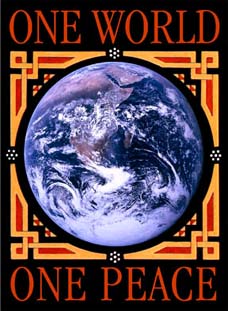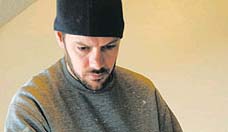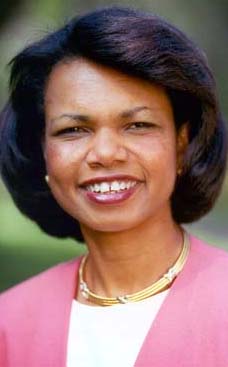
I asked Carter whether it would be helpful to appoint a high-profile director. "Well, I think so," he replied, qualifying this by pointing to the example of UNICEF (United Nations Children's Fund), which has a long record of appointing movie stars and other celebrities as public spokespeople and ambassadors. "The Director may be a tough, hard-nosed , very competent, proven manager of large and complex organizations and big budgets," Carter commented, "and quite often the recipient countries have no idea who the Director is, but, but we could adopt the policy of UNICEF to have a representative, for public relations, for raising funds, for raising awareness, someone who's well-known, maybe a famous sports figure or famous actor or actress or famous musician. I think that's something that could be done." He added: "If that request was made to someone who is famous I think they would respond favorably."
Former President Jimmy Carter says the Peace Corps is in the forefront of Opportunity
"THE PEACE CORPS IS IN THE FOREFRONT OF OPPORTUNITY."
by N.J. Slabbert
In a personal interview filmed at the Carter Center in Atlanta in September I asked the former president how much could be reasonably expected from the Peace Corps by way of altering the world's perception of the US, especially in Islamic areas. He told me America's image "certainly can be affected in areas of the world that now look upon the US unfavorably." Just two days before our interview, Carter said, he had returned from visits to Mali, Nigeria and Ethiopia (90%, 50% and 45%-50% Muslim respectively), and there were some regions of those countries “where the US had a very unfavorable image". The Peace Corps had volunteers in all three countries, he said, "and I think they could be a good avenue towards putting forward the best possible image of America". This image would associate the US with justice, peace, humility, service and compassion. "To me those are the characteristics that historically have made our nation a great one. But in recent years we have seen that that list of characteristics, at least among some people, has become very doubtful. I think that the Peace Corps can correct that misconception of the basic motivations of most citizens of my country."
Carter noted that he may be the only person in the world whose mother and grandson had both served in the Corps: "The Peace Corps means an awful lot to me personally." He is in favor of expanding the Corps because he and former First Lady Rosalynn Carter "go to some countries that are desperately in need, and the leaders of those countries appeal to me as a former president." He would like to see "a greater allocation of funds for the Peace Corps" because in national security terms -- "that is, reducing the animosity of poverty-stricken people around the world toward America" -- the Corps is "in the forefront of that opportunity".
Carter's perspective on the Corps is arguably unique because of the extent to which the agency's work complements that of the Atlanta-based Carter Center, a non-profit founded in 1982 by the former president and his wife. In partnership with Emory University the center promotes human rights and projects that combat poverty, disease and "unnecessary human suffering" around the world. One of the ways he would like to see the Corps expanded is via increased cooperation with the center. "We really would like to have fifty Peace Corps volunteers here to help us with programs. The Carter Center has active programs in sixty-five nations on earth. Thirty-five of them are in Africa. They are the poorest, most forgotten, destitute people in the world. And we work side by side with Peace Corps volunteers. Sometimes they are our direct representative in some of the most remote areas ... and we depend on them to represent the Carter Center."
Carter sees several ways to beef up the Corps, starting with a greater effort to recruit senior citizens. "I have, maybe, a biased point of view because my mother didn't go into the Peace Corps until she was about 70 years old and it transformed her life. And there are many people who have retired from very successful careers who I think could be specifically recruited to the Peace Corps." He'd also like to see the Corps given greater freedom to aid countries whose leaders don't happen to be popular with the White House. It "troubles" him, he explains, that "sometimes there are nations whose leaders might be alienated from the White House or from Washington who are deprived of the services of the Peace Corps." Carter would like to see a policy of greater inclusiveness whereby the Corps does not have to "judge a country by whether we like their leaders, who quite often are subject to change", but "only on how much their people need Peace Corps services."
On the subject of the position that the Peace Corps occupies in America's top-of-the-mind awareness, I asked Carter whether it would be helpful to appoint a high-profile director. "Well, I think so," he replied, qualifying this by pointing to the example of UNICEF (United Nations Children's Fund), which has a long record of appointing movie stars and other celebrities as public spokespeople and ambassadors. "The Director may be a tough, hard-nosed , very competent, proven manager of large and complex organizations and big budgets," Carter commented, "and quite often the recipient countries have no idea who the Director is, but, but we could adopt the policy of UNICEF to have a representative, for public relations, for raising funds, for raising awareness, someone who's well-known, maybe a famous sports figure or famous actor or actress or famous musician. I think that's something that could be done." He added: "If that request was made to someone who is famous I think they would respond favorably."
I asked Carter if he believed the Peace Corps could be improved by being made more technologically sophisticated. His reply: "I think the utilization of modern technology, particularly in the communication field, is something that ought to be introduced into the Peace Corps very aggressively. My grandson, who returned recently from the Peace Corps after two and a half years, took with him his computer and he had to ride about 20 miles before he could find a place that had electric power and a telephone circuit into which he could connect." With modern generators, solar cells, small, very efficient computers and satellite networks, Carter said, "I don't see why, within the bounds of reason, every single Peace Corps person ... shouldn't have instantaneous communication with the outside world. I think that would enhance not only their own spirit and self-respect and security, but it would also let them have a more effective way to deal with the people around them, if the Peace Corps volunteer, instead of being isolated for three or four weeks or months at a time, had a daily awareness of world events, and what could be happening that reflected the particular nation in which they serve, or the US." He added: "I think that technology is available and with a minimum contribution to each Peace Corps volunteer those standardized mechanisms could be utilized."















